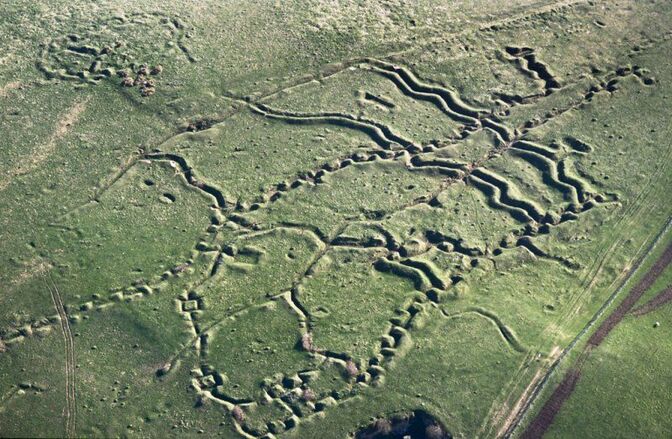 Source: Pinterest UK Henry-Jacque’s first collection of poems on the First World War is called La Symphonie héroïque; it won a prize, the Prix de la Renaissance, in 1922. Henry-Jacques (1886 - 1973) was a pseudonym; his name at birth was Henri Edmond Jacques. The title and structure of the book reflect his interest in music; after the war, he published two music journals and was recognized as a musicologist. In addition to two other books of poetry based on his wartime experiences, he was a journalist, a novelist, an adventurer at sea. He circumnavigated the globe several times, twice sailing around Cape Horn.
In “Landscapes” (“Paysages”), a soldier is entering the trenches and marching towards the dangerous front line to work as an observer, as in the poem I recently posted, “Assassin Poet.” As other stories and poems from the war reveal, the trenches were confusing and disorienting, even for an experienced soldier; the aerial photo above gives some idea. The front and the war were, as the poem says, everywhere. Enemy planes, mines placed by sappers in tunnels under the trenches, artillery shells, and gas attacks affected far more than the designated front line. Landscapes by Henry-Jacques I. In the wall, wide as a porch, a hole that opens on a hole, barbed wire that flays the skin. A hand notice riddled with holes: "Trench four, to the lines,” to war, over there, everywhere. As black as vine shoots, the pickets all skin and bone show their signs as they stand watch on top of sacks cast up on this petrified sea. II Before you is the gate of hell; pass through, but watch out for the front, that too vague something: the front. It’s there, above, below, in the air, deep opening into deep, impalpable, an anguish clinging to the flesh. There, where your eyes come to rest, that ridge—it’s near yet very far, the end of the world, that low crest, right there… a little farther… a bit less. III A little closer, a little farther… the trench runs to every quarter; drifting away but never moving, everywhere and nowhere fleeing in broken angles of separation that snap even the greatest strength. But fighting the weary, dejected fear of anything that moves or stirs, of even the air tense with silence, the heart divines that it is there! IV The outpost’s distrustful eye, its furtive spyhole, narrow transom cut in the never-ending wall. Stretching outward his watchful mind, a man looks through the hole and hazards his eye to those he cannot trust. He scrutinizes the soul of war, but sometimes, slipping across the edge, his gaze takes in the whole of death beyond life, beyond the earth.
0 Comments
Leave a Reply. |
AuthorWrite something about yourself. No need to be fancy, just an overview. Archives
July 2024
Categories |
 RSS Feed
RSS Feed